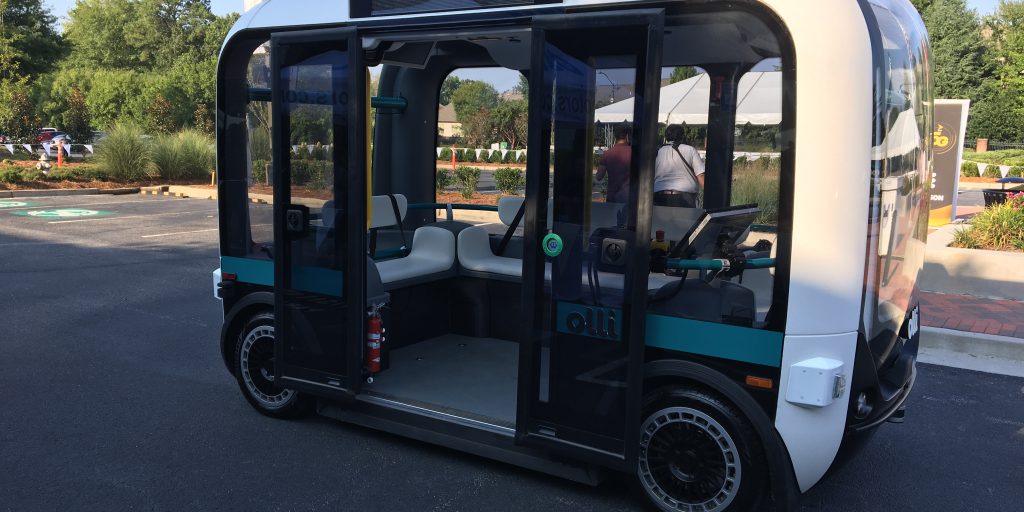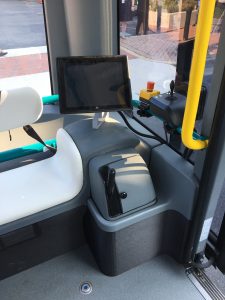Test driving the future
Amid a large audience, humid Georgia heat and palpable anticipation, Peachtree Corners, Ga., officially unveiled its new, city-owned technology testing laboratory, Curiosity Lab, on Sept. 11.
A centerpiece of the lab is a 1.5-mile-long autonomous vehicle test track set in a 500-acre commercial office park. It’s on this track that ground mobility company Local Motors is testing Olli, the world’s first co-created, autonomous electric vehicle.
“As we look forward to transportation issues all across this country, I want people to look at what we’re doing here in Georgia and realize that the future for transportation is… about innovation. It’s about ideation. It’s about this right here,” Georgia Lt. Gov. Geoff Duncan declared in remarks at Curiosity Lab’s opening ceremony.
In opening the lab, Peachtree Corners joins a slew of other communities actively experiencing similar transportation innovation. Autonomous vehicles (AV) have been piloted in Boston, Las Vegas, Pittsburgh, Chandler, Ariz. and Arlington, Texas, among other cities. Additionally, the Ohio Department of Transportation, Union County, Ohio, and three Ohio cities — Columbus, Dublin and Marysville — collaborated to form the 33 Smart Mobility Corridor project, which seeks to make a 35-mile highway corridor a proving ground for smart mobility technology, which includes AV and connected vehicle (CV) technology.
But Curiosity Lab has a few traits that make it stand out among other AV testing facilities, according to Peachtree Corners City Manager Brian Johnson. For one thing, the lab is free to use.
The city — which owns the lab — honors proprietary data of lab users and does not have a requirement of intellectual property ownership by the city. The lab is an extension of the city’s 25,000 square-foot technology incubator, Prototype Prime, and it can test far more than just AVs and CVs. In addition to classroom and conference space, it offers smart streetlights and smart pole technology from Georgia Power and sitewide 5G connectivity as part of a partnership with Sprint.
Widespread connectivity for aiding AV and CV technology is one thing that Marysville, one of the 33 Smart Mobility Corridor cities, shares with Peachtree Corners.
However, Marysville is set to offer connectivity on a grand scale as part of its Connected Marysville project. All 27 of the city’s traffic lights are being equipped with dedicated short-range communication (DSRC) radios, according to the 33 Smart Mobility Corridor website.
As of Oct. 2, eight traffic signals had the technology, and the other 19 are expected to have it by the end of 2019, Marysville Director of Public Service Mike Andrako says. All of the city’s traffic lights will eventually communicate with 500 vehicles in the city that will be outfitted with special on-board units (OBUs) that facilitate vehicle-to-vehicle (V2V) as well as vehicle-to-infrastructure (V2I) communication.
One-hundred of those vehicles will be city fleet vehicles; from fire trucks to maintenance vehicles, Andrako says. The city is working with the Ohio Department of Transportation to install the remaining OBUs on 400 privately-owned vehicles.
The city expects to outfit its fleet vehicles with OBUs in 2020. Officials will also begin the campaign to recruit volunteers for the OBUs next spring or summer, and Andrako admits that some marketing and incentives will be needed to obtain volunteers for the project.
The net result, Andrako says, is a testing ground for software developers and original equipment manufacturers that are working on connected vehicle technology. Specifically, connected traffic signals will have access to data concerning vehicle speeds, positions, arrival rates, acceleration/deceleration rates and queue lengths, according to 33 Smart Mobility Corridor. The communications technology will also be able to send OBU-equipped vehicles traffic signal phase and timing data, driving safety messaging and pedestrian crossing warnings.
Allowing companies to test this technology on traffic signals and vehicles with OBUs will push that technology forward so that it will become standard features on vehicles quicker.
“To get to that point, [companies] have to have a city that has this technology so they can start testing with it in the real world and not in a lab or in a parking lot somewhere,” Andrako says.
One of the factors that helped Marysville become that real-world test lab is the fact that, like Peachtree Corners, Marysville is a small city. Keeping track of 500 CVs on the roadways of a city with under 25,000 residents wouldn’t be a tough exercise, Andrako says.
“Because we don’t have a lot of background traffic to begin with, we could easily say that at any point in time, 1 out of every 20 cars on the roadway… could be a connected vehicle,” Andrako says.

Marysville, Ohio, is outfitting all of its traffic signals with connected vehicle technology that will allow them to collect data and transmit it to vehicles equipped with special on-board units.
A smaller city naturally means smaller government, and Peachtree Corners Mayor Mike Mason cites minimal bureaucracy and a lack of politics as an advantage of a technology testing lab in a city of about 43,000. “We can make things happen without a lot of delay,” he adds.
Moreover, the city has just five employees, and Mason says the city views public-private partnerships as a way to do anything. So, in addition to its partnerships with Georgia Power and Sprint, Curiosity Lab has a partnership with Georgia Institute of Technology faculty for conducting technological experiments and Delta Air Lines wishes to partner with the Lab to test its four-wheeled vehicles on the test track, Mason says.
Establishing Curiosity Lab is more than just a means of fostering technological innovation and pragmatic P3s, though. It’s an economic development tactic as well.
“If [people] want to test [at Curiosity Lab] for two or three days or a week, they’re going to stay at a hotel in Peachtree Corners and eat at restaurants in Peachtree Corners,” Mason says. “And if they say, ‘You know what, we really like it here. We want to get some office space,’ then they’re going to get a lease of some office space here.”
Mason made that observation on Oct. 2. Almost prophetically, an Oct. 8 news release notes that the American Society of Heating, Refrigerating and Air-Conditioning Engineers (ASHRAE) moved its global headquarters to Peachtree Corners and will partner with Curiosity Lab to support smart city technology innovation.
In the release, ASHRAE Executive Vice President Jeff Littleton says, “Peachtree Corners’ innovative approach to technology testing and development made our relocation especially appealing.”
Peachtree Corners footed the bill for Curiosity Lab through its operating budget and funds from an optional sales tax used to fund capital outlay projects in Georgia. Likewise, a $5.9 million, 2016 federal Advanced Transportation and Congestion Management Technologies Deployment Program (ATCMTD) grant helped fund the 33 Smart Mobility Corridor. The grant covers outfitting Marysville’s traffic signals.
Andrako hopes that Marysville’s actions show that any small city in the U.S. can replicate its work — even if his city becomes arguably the first fully connected city in the U.S.
“This technology can be deployed in a small town like ours, we can represent Anywhere, USA. It can really be deployed anywhere,” Andrako says. “So, that is our hope that this shows that it doesn’t cost a lot of money, and it’s not an impossible task to upgrade all of your traffic signals to communicate with connected vehicles.”





















